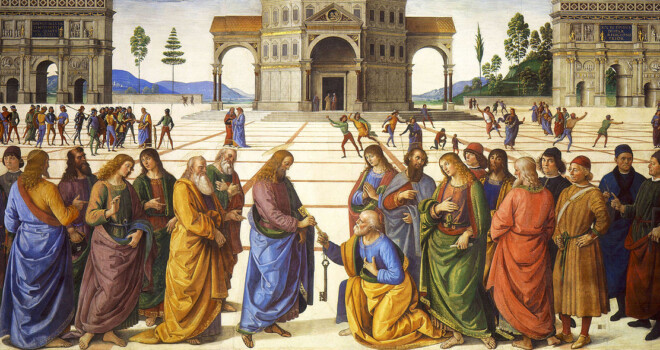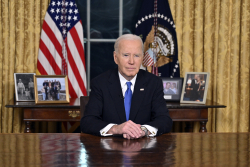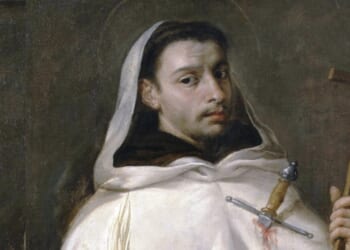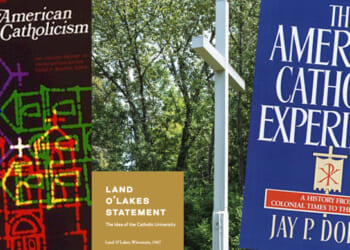Have you ever wished you could cast a vote in the conclave to elect the next pope, even though you’re not a cardinal? Do you know that you can still participate in this sacred process through the power of prayer? When you earnestly pray to the Holy Spirit to guide the cardinals in selecting a soul according to the Lord’s heart, you’re exercising a profound spiritual influence. You don’t need to research candidates—who are often hidden from public view anyway. There’s no registration required, no credentials to present. All you need is your rosary in hand, time spent before Jesus in the Blessed Sacrament, attendance at Mass, praying a Novena, or praying the breviary. These simple acts of devotion can help shape the future of the Church.
In his profound commentary on 2 Chronicles 22, Don Dolindo Ruotolo draws a remarkable parallel between the succession of kings in ancient Judah and the election of popes in the Catholic Church. The chapter details how after King Joram’s death, his youngest son Ochozias was made king by “the inhabitants of Jerusalem” following the slaughter of his older brothers by foreign raiders.
Don Dolindo was struck by this unusual phrasing—rather than the typical succession formula used elsewhere in Scripture, this passage specifically notes popular involvement in Ochozias’s selection. This distinctive wording led Don Dolindo to contemplate the mysterious interplay between divine will and human agency in leadership succession. He observes that just as God preserved the Davidic lineage despite human failings and political machinations in ancient Judah, so too does He maintain the unbroken apostolic succession from St. Peter through history, even when human elements in papal elections are imperfect.
Don Dolindo further notes that Queen Athalia’s subsequent usurpation of the throne and attempt to destroy the royal lineage—thwarted by the hidden preservation of the infant Joas—mirrors the various historical attempts to compromise or usurp papal authority, all of which ultimately failed to break the divinely protected succession of Peter’s chair.
In the following extract, Don Dolindo highlights how our fervent prayers can truly influence papal elections, showing that when the faithful earnestly appeal to the Holy Spirit rather than relying on human machinations, God directly intervenes to guide the selection of His Vicar on Earth:
“The election of a Pope involves two predominant elements: the human and the Divine. Men elect, and God chooses and sanctions. When men are God-fearing and appeal not to passions but to the Lord, He intervenes directly to elect the successor of St. Peter, responding to their freely offered prayers by enlightening them. When the human element forms, so to speak, a foul atmosphere thickened by human freedom—when men do not appeal to Him but act on their passions—God does not intervene at the first moment of the election. He allows them to act as they wish and intervenes afterward, establishing as Pope the one whom men have chosen and deserved.
“The election places the Pope in the unbroken line of St. Peter’s successors, in whom the light of supreme authority so predominates that individual failings hold no weight. The Supreme Shepherd is like a lamp, dusty and stained externally, which becomes radiant light once connected to the current that illuminates others and guides them safely through life’s winding paths. God’s respect for human freedom remains paramount in every act of Divine Providence, even in electing the Church’s leader—perhaps the highest expression of His ineffable reverence for His creatures.
“This resolves one of the gravest difficulties in papal elections and bishop appointments, where the Holy Spirit places leaders to govern God’s Church. The human mind struggles to understand how an unworthy pastor can be ‘appointed by the Holy Spirit’ and may rebel against such authority. Yet even a wayward shepherd, canonically installed, is placed by the Holy Spirit as an expression of the freedom God scrupulously respects. It is foolish and sinful to refuse obedience to God’s representative under the pretext of unworthiness, as the legitimacy of his office remains intact. When the Supreme Pastor is canonically elected, the factors influencing his election are incidental to its validity, and obedience is obligatory.
“Moreover, even under less holy Popes and less upright pastors, saints have flourished in the Church—including the greatest saints. This shows that those who seek God can draw grace even from a flawed conduit. God’s infinite goodness does not withhold aid, even from the unworthy, making them channels of grace for sincere souls. Like sunlight piercing fog, His grace warms and nourishes the humble soul striving to grow.
“Does it matter if the man representing divine power is reproachable? The authority he holds is distinct from his personal life—a gem that retains its value even buried in barren soil. Our faith grows greater when we honor God through a leader who obscures his office; our submission becomes deeper, more meritorious, and more fruitful in supernatural blessings. Let God judge men, and let us bow before their authority when it represents His own.”
As we contemplate this sacred mystery of divine guidance and human participation, let us turn to the Blessed Virgin Mary, Mother of the Church and Queen of the Apostles. We thank Jesus and Mary for having chosen excellent popes for the Church, even during our lifetimes. Through Mary’s powerful intercession, may our prayers become even more efficacious in the Holy Spirit’s work of selecting worthy shepherds.
In times of uncertainty about Church leadership, remember Christ’s enduring promise to Peter: “And I say to you, that you are Peter, and upon this rock I will build my Church, and the gates of Hell shall not prevail against it” (Mt. 16:18). This divine guarantee, coupled with His assurance, “Behold I am with you all days, even to the consummation of the world” (Mt. 28:20), confirms that the Lord never abandons His Church. Mary’s maternal gaze watches over the Barque of Peter, and her immaculate heart beats in perfect harmony with her Son’s desire for holy shepherds.
Let us pray with confidence, knowing that God’s providence safeguards His Church through all storms and that even our smallest prayers, offered through Mary’s hands, contribute to the splendor of His plan. In the words of Don Dolindo, our faith grows greater when we trust in God’s mysterious ways, and our submission to His divine will becomes deeper, more meritorious, and more fruitful in supernatural blessings.
Jesus, I surrender myself to You, take care of everything!
Author’s Note: If you would like to read more about Don Dolindo’s spirituality, check out this book: Don Dolindo’s Spiritual Guidance.
Image from Wikimedia Commons
From Ruotolo, D. D. (1939). Commento alla Sacra Scrittura. Apostolato Stampa, 33.
















